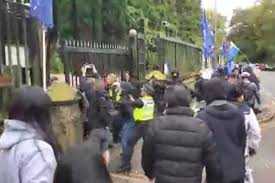
An incident outside the Chinese Consulate building in Manchester in October of this year, had led to the UK’s Foreign Office requesting that their government waive diplomatic immunity for the consul-general Zheng Xiyuan, together with five other men, so as to enable law enforcement authorities to conduct interviews to establish the full facts.
They were given until 15 December to respond and if no such permission was forthcoming, then the British government would have been left with no choice but to expel the diplomats. Beijing apparently were forewarned of this likely next step and stepped in themselves by proactively removing its officials before they were declared persona non grata, or in other words… unwelcome.
Peaceful protest
The incident occurred on 16 October involving a group of around 40 demonstrators, many of whom were from Hong Kong, and had gathered outside the consulate for a peaceful protest, which as a small diplomatic office, cannot be entered without consent, despite being on UK soil.
They were there to protest against the ruling Chinese Communist Party.
Man dragged inside consulate grounds
They displayed banners and were chanting uncomplimentary slogans when a group came out of the building wearing masks and proceeded to attack the nearest protesters to the gates, dragging one man inside the consulate grounds, where he was assaulted.
Video footage showed that amongst that group was Xiyuan; fortunately police officers on duty reacted quickly to intervene and pull the protester back outside before he was too badly injured; after which a request was made by the Greater Manchester Force to be allowed to conduct a series of interviews, particularly with the consul-general.
Request for diplomatic immunity to be waived
The UK government had informed China that the six officials needed to waive their right to diplomatic immunity, a status reserved for foreign diplomats, which means officials and their families cannot be arrested, or prosecuted for any crime, or civil case.
China’s only response was to claim that there had been attempts to illegally enter the consulate grounds, something that was proved to be incorrect after the study of captured images.
Denials from the Chinese
Realising that time was about to run out for the six men, China took matters into their own hands, probably to save embarrassment and attempt to de-escalate the dispute, and recalled the men.
A spokesman for the Chinese embassy in London said that the UK had failed to protect its staff; adding that it had launched its own representations with Britain over the incident, but also played down the removal of the men by insisting that it was simply a case of normal rotation of Chinese consular officials, after completing a term of office.
Disappointment for the Foreign Secretary
Foreign Secretary James Cleverly had initially stated that if the police determined that there were grounds to charge any officials: “We would expect the Chinese consulate to waive immunity for those officials and if not then diplomatic consequences will follow.”
Upon hearing of the men’s departure he expressed his disappointment that none of them would now face justice, but added: “We will continue on the world stage and domestically to abide by the rule of law and we expect others to do likewise.”
Hong Kong man was the victim
Bob Chan, formerly of Hong Kong, was the man who was attacked and said he had relocated to the UK with his family to live freely and what happened to him outside, and then inside the consulate grounds, was unacceptable and illegal.
He added that he was left physically and mentally hurt and felt that the diplomats should have been charged; but accepted that their withdrawal had given him a sense of closure.
Mr Chan described the scene as shocking explaining that at no time did he try to enter the consulate, and that the protest was a peaceful one. “I held on to the gates where I was kicked and punched, so I could not hold on for long, and found myself pulled inside.”
He continued to say that other protesters were trying to get him out, but it only stopped when a uniformed officer pulled him clear.
Consul-general denies involvement despite evidence to the contrary
Before his removal, Mr Xiyuan, who was effectively in charge of the consulate building, initially denied attacking Mr Chan, but after being forced to admit his involvement after photos identified him, he changed his approach saying that he had only been trying to protect his colleagues; adding that Mr Chan was “abusing my country and my leader, so I think it is my duty.”
Showing total contempt for video evidence that completely contradicts his version of events, Xiyuan said: “I did not beat anybody and I did not let my people beat anybody. The fact is, the so-called protesters beat my people.”
Former leader angry at slow response
Former Conservative Party leader, Sir Iain Duncan Smith, said the UK should have formally declared the diplomats persona non grata from the very start, and kicked them out immediately; insisting that by letting the Chinese take them back uncharged simply “isn’t justice”.
Beijing refuses to acknowledge blame
The foreign ministry in Beijing defended the actions of consulate staff, still trying to insist that the protester had illegally entered the grounds. Spokesman Wang Wenbin said that any country’s diplomats would have taken “necessary measures” to protect their premises if they felt they were under attack.
In response, a UK foreign office statement reiterated that all diplomats and consular staff based in the UK, must respect the UK’s laws and regulations.
Changes in law driving Hong Kong citizens to the UK
Last year, a new visa system gave in the region of 70 percent of Hong Kong’s population the right to live, work, and study in the UK, with a route to citizenship.
More than 100,000 people have arrived on the new visas, as Beijing’s influence over the former British colony continues to increase, following the introduction of a controversial national security law.












0 Comments